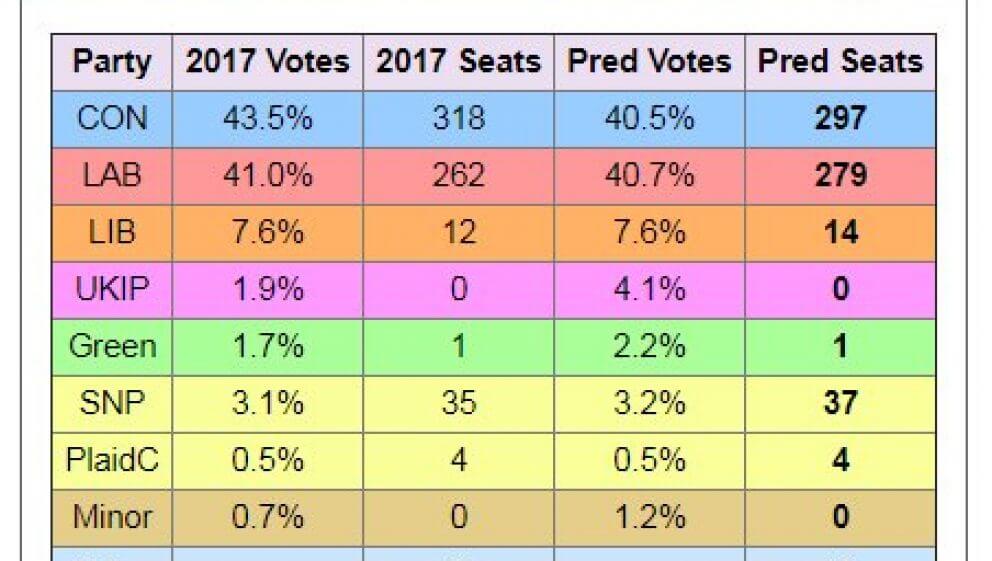Page 48 of the Tory Manifesto Will Lead the UK Into Tyranny

As the UK heads for another election, the Tories are re-imagining the future of the British polity. And it looks like an Orwellian nightmare. | Image: Dan Kitwood/Pool via AP
- Page 48: Under scrutiny.
- Media bias is more prevalent than ever.
- The system is rigged and getting worse.
Peering past the rhetoric of the Conservative manifesto reveals a scary insight into life under a Tory government. Here’s how screwed Britain is under Boris.
Elections all over the world are often chock-full of half-truths, scrutiny, euphemisms and ad hominem attacks. The imminent UK general election is no exception.
This election campaign has been particularly unforgiving. The country is still torn on a resolution to Brexit – a throbbing sore spot that remains the main focal point of the vote. The departure from the European Union threatens to leave the UK without a solid foundation for trade. One option, of course, is U.S. intervention – something which may leave the National Health Service (NHS) open to privatization. Nevertheless, these fundamental issues haven’t prevented the mainstream media from digressing into personal attacks and showing their inherent bias.
This blatant partisanship has unfortunately set the stage for the Tories’ more insidious plans.
Page 48
With a week to go until Britain decides on a new government, the speeches, interviews, and policies of the major parties are under the lens.
One particular page in the Conservative Manifesto has caught the eye of many.
In the UK, #Page48 has become a prevailing Twitter trend. It seems the Tories decided to put all their most totalitarian policies into a single – scarcely veiled – page near the end of its 62-page manifesto — the now-infamous Page 48.

Several clauses pledged by the Conservatives have raised cause for concern. Here’s a breakdown.
No Second Stage of the Leveson Inquiry
The Leveson inquiry was a judicial review of the practices of the British press in the wake of the News International phone-hacking scandal . Now, the scrapping of the inquiry isn’t necessarily a surprise. Parliament already voted down Leveson part 2 last year. However, combined with the recent display of media bias against Labour, it feels like an inappropriate time to be putting less scrutiny on journalistic ethics.
Pejorative accusations of antisemitism within the Labour party have become a running theme in this election. While this is an egregious issue in need of stamping out within every facet of society, the double standard set by the media has been almost overwhelming. On the one hand, we have Labour leader, Jeremy Corbyn, who has a well-documented history of fighting bigotry and – ironically – antisemitism . A cause that he has pledged to continue in his leadership of the Labour party.
On the other, we have Conservative leader Boris Johnson, who, in his well-documented years of journalism, has openly written prejudicial articles. These include referencing African people as having “watermelon smiles,” comparing Muslim women to “letterboxes,” and referring to gay people as “bumboys.” Yet – for the most part – the media seems to have conveniently forgotten about this come election time .
This partisanship has been particularly evident within the BBC, from editing footage to paint Johnson in a better light to a lighter touch when it comes to interviewing protocol . This bias has even manifested itself as a trending hashtag: #BBCimpartiality. With so much media support, it’s no wonder the Tories want the judiciary to leave the British press be.
Interfering With the Separation of Powers
One particularly Orwellian pledge attacks judicial review. As per their manifesto , the Tories will ensure the judiciary “is not abused to conduct politics by another means or to create needless delays.” This is a fairly vociferous nod to the Supreme Court’s decision to reverse the outlawed prorogation of parliament.
Back in September, In a glaring scheme to frustrate any debate on Brexit, Johnson attempted to suspend parliament until mid-October. This would have made it so that any opposition to the then, do-or-die date for leaving the EU would have been silenced. Instead, after a Judicial review, the Supreme court ruled the prorogation illegal, forcing Johnson to reopen parliament.
In essence, this proposed policy would limit the role of the Supreme Court, placing inordinate power within government hands.
They’re Sticking With an Undemocratic System of Voting
Another vilified clause is the decision to stick to an archaic First Past the Post (FPTP) system. This is a voting system that is not only unrepresentative of overall public choice but also demonstrably skewed towards a Tory majority.
Within FPTP, the party with the most votes forms a government. However, winning via the highest percentage of votes doesn’t dictate a majority within a multi-party system. Instead, a ‘winner’ may only share 35% of the votes, while the other parties divvy out the remaining 65% between them. This means that a party can form a government with less than 50% of public backing.
Further, an electoral bias exists within FPTP. Even if Labour and Conservatives were in a dead heat, the Tories would control more seats in parliament.

One reason for this is the geographical makeup of party support – especially constituency size. If one party does better in larger constituencies, and another does better in smaller ones, the bias would positively affect the latter. Prior to the 2010 election, Labour held this bias. However, following their subsequent victory, the Conservatives redrew the constituency boundaries in their favor.
Page 48 doesn’t only threaten the role of law within Britain, but democracy in its entirety. If the notion of NHS privatization doesn’t scare the UK, page 48 of the Tories’ manifesto should.